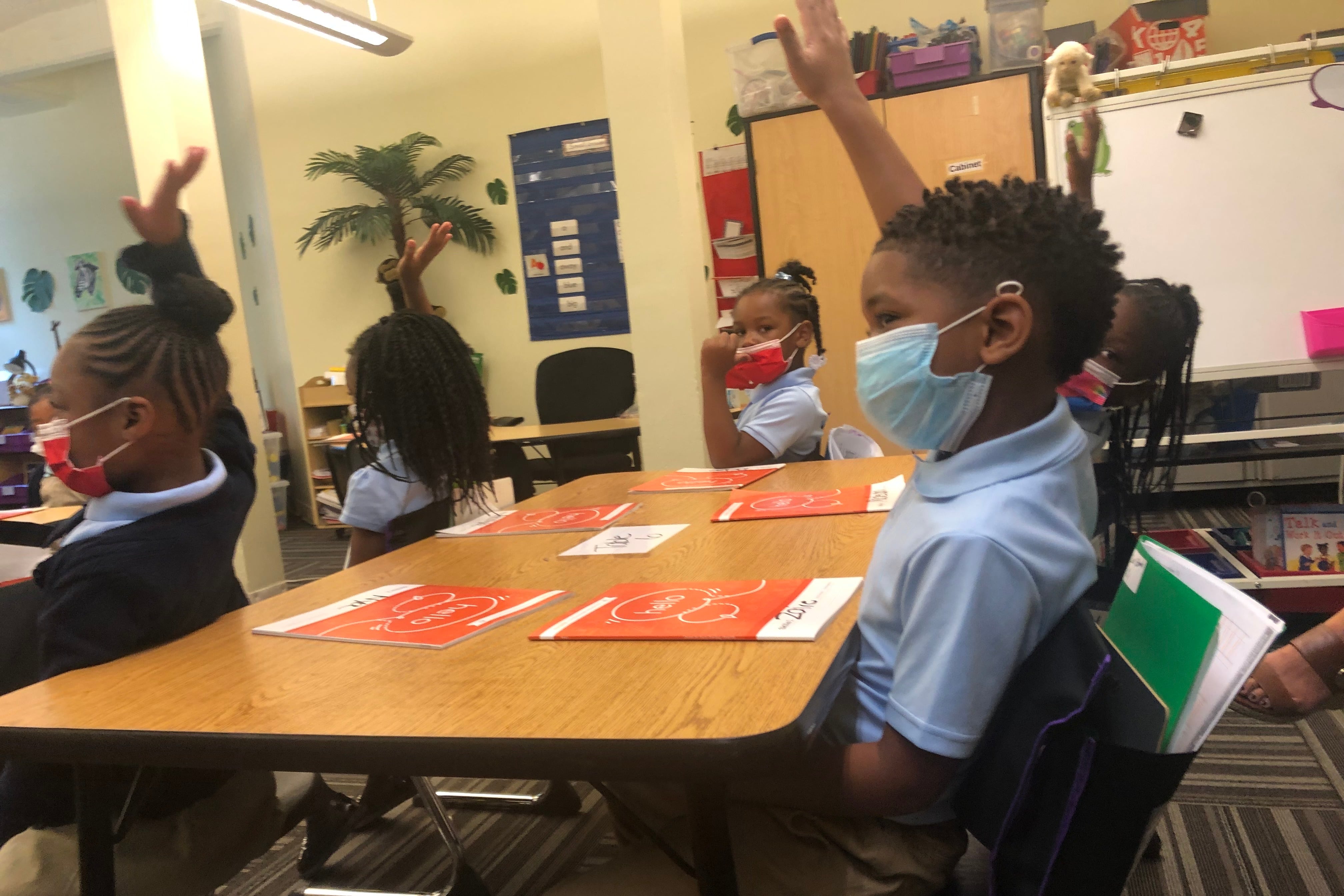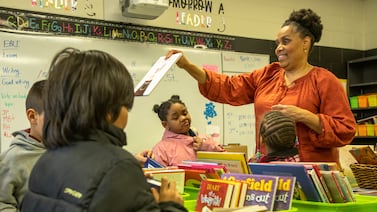Veteran kindergarten teacher Tanya Davis held up a sharp No. 2 pencil as if she were about to write a word in the air. Soon, 26 youngsters were following suit, and Room 10 was a sea of little fingers writing imaginary words in the sky.
The pencil was familiar to many. But, to a few, it still appeared foreign. Davis and her teaching assistant worked the room loosening fists and gingerly repositioning fingers until everyone completed the task: drawing a vertical line on a workbook page.
It was little more than a week into kindergarten at LEARN Charter Schools’ Hunter Perkins campus in Chicago’s Auburn Gresham neighborhood, and Principal Latrice Franklin could already say with certainty that her youngest students will need more — much more — than any kindergarteners in her decades-long career.
During in-person assessment interviews before the first day of school, three youngsters did not recognize their names. Educators observed other telltale gaps, from failing to recognize letters or colors to problems with basic counting.
“We’ve been in a pandemic where most children have only been online or they’ve been in front of screens,” said Franklin. “Some of them can’t hold pencils, color, or cut — because that wasn’t the expectation. They were on a computer the entire time.”
Evidence is starting to emerge about setbacks in math and reading among America’s older schoolchildren, but there’s no consensus yet on how the pandemic impacted the country’s youngest learners — and no clear guidance for how to catch them up. In Illinois, data from a key assessment for kindergarten readiness won’t be publicly available until the end of the school year.
That leaves educators like Franklin adapting as they go. A new kindergarten pre-screener her team designed and introduced before the school year provided critical insight into the incoming class, even if not every young learner showed up to take it. An orientation week for families with a mix of virtual meet-and-greets and in-person visits to the school helped shore up anxious parents — as well as enrollment (citywide, enrollment in kindergarten and pre-kindergarten dropped precipitously last year).
Schoolwide, teachers are doubling down on calm classroom techniques such as deep breathing and mindfulness, and Franklin mandated daily small group instruction in every classroom with 30 minutes each of reading and math, at minimum.
To get teachers ready, Franklin also extended professional development from one week to two and trained a careful eye on increased training and support for aides and teachers’ assistants.
“I wanted to make sure we’re not lowering expectations just because some kids may be behind,” she said of the focus on what she called “mindset” professional development.
Crucial to Franklin’s approach, too, is an of-the-moment philosophy that specialists such as speech pathologists, psychologists, and social workers should be pushing into classrooms in these first few weeks and months more than they are pulling out children who already have Individualized Education Programs, or IEPs.
“Mostly I’m trying to see what kids are comprehending, and whether they are able to follow simple directions,” said Paige Cianciolo, a speech pathologist who divides her time between two LEARN campuses. “I’ve noticed that it is taking teachers five to six repetitions of one direction for children to follow and that the processing of language may be more delayed than it has been.”
Just having another adult in the room to provide visual cues and respond to one end of a bustling long table of wiggly five-year-olds has been critical in the early weeks, said Bridget Kuumba, a kindergarten teacher at LEARN Hunter Perkins. “It’s so important.”
Kuumba isn’t so worried about academic gaps. In recent weeks, the real impact of the pandemic has emerged on the playground and in her students’ social interactions. Instead of typical interactions, she’s seen some aggressive behaviors — such as pushing another child on a playground instead of simply asking them to play.
“When it comes looking different from a regular kindergarten class, I think it’s just about managing emotions and figuring out what is a kind and productive way to play with friends,” she said, acknowledging that youngsters must master self-regulation and a new set of COVID rules around masking and social distancing.
As the pandemic wore on this past spring and summer, researchers with the National Institute for Early Education Research at Rutgers University documented increasing numbers of parents reporting problems with their preschool children’s hyperactivity, lack of self-regulation, and struggles paying attention. Concerns were consistent across race and family income, said Steven Barnett, the senior co-director of NIEER.
The NIEER research suggests that fall’s kindergarten class may come in needing more from adults, Barnett said. Fewer children had access to formal preschool programs last year as enrollment dropped, programs closed, and parents lost work. Stressed-out mothers and fathers read significantly less to their children. And, passive screen time among youngsters skyrocketed.
“The home learning environment was taking a hit at the same time that preschool enrollment was taking a hit,” said Barnett. “This year’s kindergarteners will need considerable extra supports — and their teachers will need considerable extra supports.”
“It was hard to come back, and some days it seems to not make sense, when these kids are all touching each other on the playground,” said Kuumba. “I am extremely patient with them — now it’s more important than ever as a teacher that you love children and the act of teaching.”
Still, she acknowledges, more behavioral issues can be stressful to teachers and could trigger burnout in some after an already difficult pandemic year. That’s another adaptation at LEARN Hunter Perkins: a mental health day that teachers can take when needed.







